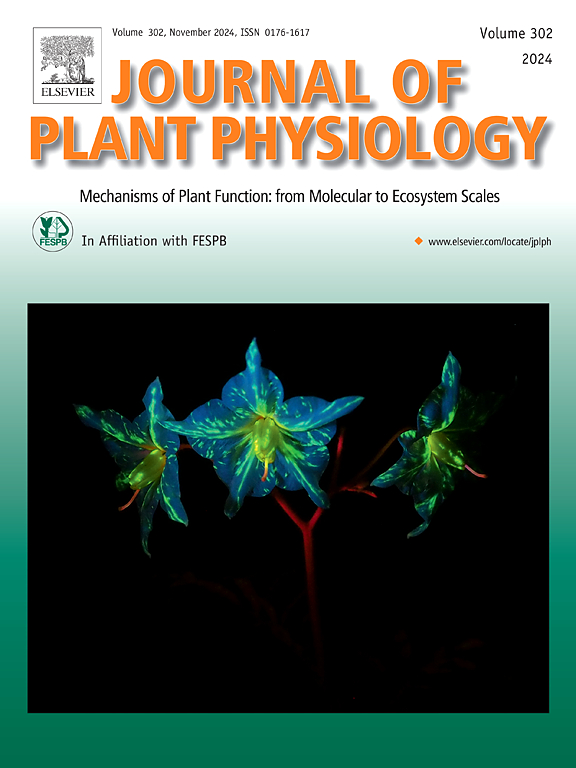钾转运体TaHAK18对钾胁迫条件下小麦生长和钾吸收的影响
IF 4.1
3区 生物学
Q1 PLANT SCIENCES
引用次数: 0
摘要
钾是植物生长发育不可缺少的营养物质,在植物的抗逆性中起着至关重要的作用。在植物的钾离子调控网络中,HAK/KUP/KT基因家族包括一个主要的钾离子转运蛋白群,负责钾离子的摄取和转运。本研究对小麦基因TaHAK18进行了功能表征,该基因编码一种推定的K+转运体。质膜定位的TaHAK18在低k +条件下显著上调,并呈现组织特异性表达,在叶片中表达量最多。酵母的功能分析表明,TaHAK18弥补了K+吸收缺陷,证实了其在K+运输中的作用。过表达TaHAK18的拟南芥植株在低k +和正常k +条件下均能增强生长,鲜重、侧根形成和初生根长度都更大。大麦条纹花叶病毒介导的小麦基因沉默揭示了TaHAK18在低钾胁迫下对K+积累和植株生长有重要作用。TaHAK18具有促进转基因水稻植株生长和K+积累的能力。这些结果表明,TaHAK18是小麦钾离子吸收和体内平衡的关键调控因子,对提高植物对低钾胁迫的耐受性具有潜在意义。本文章由计算机程序翻译,如有差异,请以英文原文为准。
Impact of the potassium transporter TaHAK18 on wheat growth and potassium uptake under stressful K+ conditions
Potassium (K), an indispensable nutrient for plant growth and development, plays a crucial role in plant stress resistance. Within the K+ regulatory network in plants, the HAK/KUP/KT gene family comprises a dominant group of K+ transport proteins responsible for K+ uptake and transport. This study functionally characterized the wheat gene TaHAK18, which encodes a putative K+ transporter. Plasma membrane-localized TaHAK18 was significantly upregulated under low-K+ conditions and showed tissue-specific expression, being most abundant in leaves. A functional analysis in yeast demonstrated that TaHAK18 complements K+-uptake deficiencies, confirming its role in K+ transport. Arabidopsis plants overexpressing TaHAK18 experienced enhanced growth under both low- and normal-K+ conditions, with greater fresh weight, lateral root formation, and primary root length. Barley stripe mosaic virus-mediated gene silencing in wheat revealed that TaHAK18 is instrumental for K+ accumulation and plant growth under low-K+ stress. TaHAK18 has the capacity to enhance the growth and the accumulation of K+ in transgenic rice plants. These results indicated that TaHAK18 is a key regulator of K+ uptake and homeostasis in wheat, with potential implications for improving plant tolerance to low-K+ stress.
求助全文
通过发布文献求助,成功后即可免费获取论文全文。
去求助
来源期刊

Journal of plant physiology
生物-植物科学
CiteScore
7.20
自引率
4.70%
发文量
196
审稿时长
32 days
期刊介绍:
The Journal of Plant Physiology is a broad-spectrum journal that welcomes high-quality submissions in all major areas of plant physiology, including plant biochemistry, functional biotechnology, computational and synthetic plant biology, growth and development, photosynthesis and respiration, transport and translocation, plant-microbe interactions, biotic and abiotic stress. Studies are welcome at all levels of integration ranging from molecules and cells to organisms and their environments and are expected to use state-of-the-art methodologies. Pure gene expression studies are not within the focus of our journal. To be considered for publication, papers must significantly contribute to the mechanistic understanding of physiological processes, and not be merely descriptive, or confirmatory of previous results. We encourage the submission of papers that explore the physiology of non-model as well as accepted model species and those that bridge basic and applied research. For instance, studies on agricultural plants that show new physiological mechanisms to improve agricultural efficiency are welcome. Studies performed under uncontrolled situations (e.g. field conditions) not providing mechanistic insight will not be considered for publication.
The Journal of Plant Physiology publishes several types of articles: Original Research Articles, Reviews, Perspectives Articles, and Short Communications. Reviews and Perspectives will be solicited by the Editors; unsolicited reviews are also welcome but only from authors with a strong track record in the field of the review. Original research papers comprise the majority of published contributions.
 求助内容:
求助内容: 应助结果提醒方式:
应助结果提醒方式:


